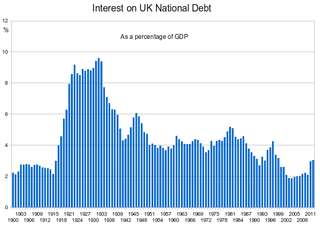 W
WCentral government spending in the United Kingdom, also called public expenditure, is the responsibility of the UK government, the Scottish Government, the Welsh Government and the Northern Ireland Executive. In the budget for financial year 2019–20, proposed total government spending was £842 billion.
 W
WConsols were government debt issues in the form of perpetual bonds, redeemable at the option of the government. They were issued by the Bank of England and the U.S. Government. The first British consols were issued in 1751. They have now been fully redeemed. The first U.S. Government consols were issued in the 1870s.
 W
WExchange controls, also known as capital controls and currency controls, limiting the convertibility of Pounds sterling into foreign currencies, operated within the United Kingdom from the outbreak of war in 1939 until they were abolished by the Conservative Government of Prime Minister Margaret Thatcher in October 1979.
 W
WThe history of the British national debt can be traced back to the reign of William III, who engaged a syndicate of City traders and merchants to offer for sale an issue of government debt, which evolved into the Bank of England. In 1815, at the end of the Napoleonic Wars, British government debt reached a peak of £1 billion.
 W
WA Premium Bond is a lottery bond issued by the United Kingdom government since 1956. At present it is issued by the government's National Savings and Investments agency.
 W
WThe United Kingdom government austerity programme is a fiscal policy adopted in the early 21st century following the Great Recession. It is a deficit reduction programme consisting of sustained reductions in public spending and tax rises, intended to reduce the government budget deficit and the role of the welfare state in the United Kingdom. The Conservative government claimed that the National Health Service and education have been "ringfenced" and protected from direct spending cuts, but between 2010 and 2019 more than £30 billion in spending reductions have been made to welfare payments, housing subsidies and social services. The effects of United Kingdom austerity policies have proved controversial and the policies have received criticism from a variety of politicians and economists. Anti-austerity movements have been formed among citizens more generally.
 W
WThe United Kingdom National Debt is the total quantity of money borrowed by the Government of the United Kingdom at any time through the issue of securities by the British Treasury and other government agencies.